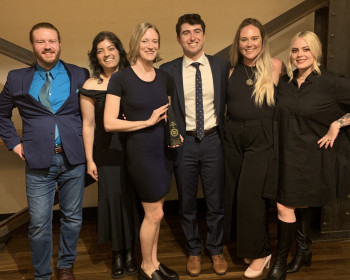Data Analysis by Law Students Helps Secure Victory for Disability Rights Oregon
In connection with their work with Disability Rights Oregon and the Criminal Justice Reform Clinic, 3L students Jemma Pritchard and Christa Doerbeck analyzed data related to fitness to proceed orders, leading to more equitable criminal justice procedures for houseless and disabled people in Oregon.
Open gallery

As a direct result of their work with Disability Rights Oregon (DRO) in conjunction with Professor Aliza Kaplan’s Criminal Justice Reform Clinic, 3L students Jemma Pritchard and Christa Doerbeck helped secure a big equity win for houseless and disabled people in Oregon.
Clerking with DRO this past year, Pritchard and Doerbeck found a substantial link between arrests, symptoms of mental illness, and status of houselessness. By examining data of Oregon State Hospital patients admitted under Oregon’s ORS 161.370: Determination of Fitness to Proceed statute, and cross-referencing for non-violent misdemeanor charges, they found a significant correlation between mental health, houselessness, and arrest. They presented this data in their report to DRO, Metropolitan Public Defense (MPD), and Oregon Health Authority (OHA). This report was subsequently used in DRO negotiations, leading to an order which prohibits individuals charged with low-level misdemeanors from being admitted to state hospitals. This preserves limited spots in Oregon State Hospital (OSH) for individuals who truly need them.
In their research, Doerbeck and Pritchard noticed a trend where people with low-level arrest charges who needed mental health care could not receive treatment due to limited capacity in OSH. This problem is twofold, according to Doerbeck: “First, those spots in OSH are not being saved for individuals with more serious charges whose trial cannot proceed until they receive mental health restoration treatment. Second, nobody should be waiting for so long and nobody should be held in a hospital longer than absolutely necessary.”
In presenting this data to the DRO, MPD, and OHA, Pritchard and Doerbeck shed light on concerns about criminalization of homelessness and mental illness, as well as concerns about the efficacy of the OSH restoration process.
“Because OSH has limited resources and space, requiring restoration to trial competency for low-level charges (that might be better addressed outside of the criminal justice system) is part of what is keeping people in jail awaiting treatment far longer than they should,” said Pritchard. Instead, these charges will be dismissed, allowing for more people to access the kinds of care that they need.
“This project taught me a lot about the additional barriers people with disabilities face in our criminal justice system, and just how much more needs to be done to ensure that equal justice is a reality,” said Pritchard. “It also reminded me how everyone, inside and outside of the criminal justice system, has a story that deserves to be heard, understood, and respected. Working on this project with DRO, and especially with this outcome, has meant the world to me and I feel honored to have been a part of it.”
Said Emily Cooper, Legal Director of DRO, “In my twenty years of practice, I’ve never seen such quality work from students that led to such a victory for clients. Excellent work, Jemma and Christa. You have very bright futures ahead of you.”
Law Communications is located in room 304 of Legal Research Center (LRC) on the law Campus.
MSC: 51
email jasbury@lclark.edu
voice 503-768-6605
Cell: 626-676-7923
Assistant Dean,
Communications and External Relations, Law School
Judy Asbury
Law Communications
Lewis & Clark Law School
10101 S. Terwilliger Boulevard MSC 51
Portland OR 97219

